
A hero is a real person or a main fictional character who, in the face of danger, combats adversity through feats of ingenuity, courage, or strength. Like other formerly gender-specific terms, hero is often used to refer to any gender, though heroine only refers to women. The original hero type of classical epics did such things for the sake of glory and honor. Post-classical and modern heroes, on the other hand, perform great deeds or selfless acts for the common good instead of the classical goal of wealth, pride, and fame. The antonym of hero is villain. Other terms associated with the concept of hero may include good guy or white hat.

A protagonist is the main character of a story. The protagonist makes key decisions that affect the plot, primarily influencing the story and propelling it forward, and is often the character who faces the most significant obstacles. If a story contains a subplot, or is a narrative made up of several stories, then each subplot may have its own protagonist.
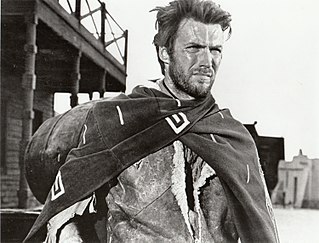
An antihero or antiheroine is a main character in a story who may lack conventional heroic qualities and attributes, such as idealism, courage, and morality. Although antiheroes may sometimes perform actions that most of the audience considers morally correct, their reasons for doing so may not align with the audience's morality. An antihero typically exhibits one of the "Dark Triad" personality traits, which include narcissism, psychopathy, and Machiavellianism.

A villain is a stock character, whether based on a historical narrative or one of literary fiction. Random House Unabridged Dictionary defines such a character as "a cruelly malicious person who is involved in or devoted to wickedness or crime; scoundrel; or a character in a play, novel, or the like, who constitutes an important evil agency in the plot". The antonym of a villain is a hero.

Frederick Reginald Ironside, known as Michael Ironside, is a Canadian actor, producer, director, and screenwriter. He is known for playing villains and "tough guy" heroes, and has also portrayed sympathetic characters.

The Byronic hero is a variant of the Romantic hero as a type of character, named after the English Romantic poet Lord Byron. Both Byron's own persona as well as characters from his writings are considered to provide defining features to the character type.

James Thomas Patrick Walsh was an American character actor. His many films include Tin Men (1987), Good Morning, Vietnam (1987), A Few Good Men (1992), Hoffa (1992), Nixon (1995), Sling Blade (1996), Breakdown (1997) and Pleasantville (1998).
Legion of Substitute Heroes is a group of fictional characters in the future of the DC Comics universe. The "Subs", as they are often called, are a group of rejected applicants to the Legion of Super-Heroes who band together, hoping to prove to the Legion that their powers are not as useless as the Legionnaires claim. They first appeared in Adventure Comics #306 and were created by Edmond Hamilton and John Forte.
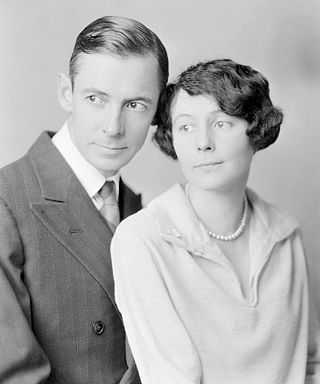
Edwin DuBose Heyward was an American author best known for his 1925 novel Porgy. He and his wife Dorothy, a playwright, adapted it as a 1927 play of the same name. The couple worked with composer George Gershwin to adapt the work as the 1935 opera Porgy and Bess. It was later adapted as a 1959 film of the same name.
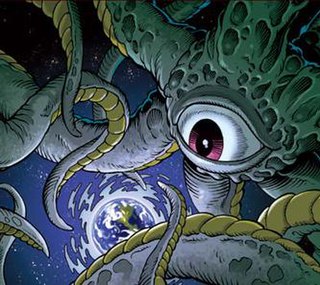
Shuma-Gorath is a fictional character appearing in American comic books published by Marvel Comics.

The Leopard's Spots: A Romance of the White Man's Burden—1865–1900 is the first novel of Thomas Dixon's Reconstruction trilogy, and was followed by The Clansman: A Historical Romance of the Ku Klux Klan (1905), and The Traitor: A Story of the Fall of the Invisible Empire (1907). In the novel, published in 1902, Dixon offers an account of Reconstruction in which he portrays a Reconstruction leader, Northern carpetbaggers, and emancipated slaves as the villains; Ku Klux Klan members are anti-heroes. While the playbills and program for The Birth of a Nation claimed The Leopard's Spots as a source in addition to The Clansman, recent scholars do not accept this.
The revisionist Western is a sub-genre of the Western film. Designated a post-classical variation of the traditional Western, the revisionist subverts the myth and romance of the traditional by means of character development and realism to present a less simplistic view of life in the "Old West". While the traditional Western always embodies a clear boundary between good and evil, the revisionist Western does not.
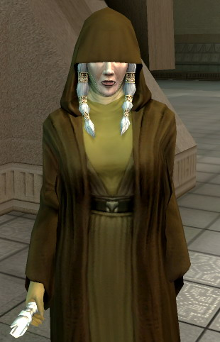
Kreia is a fictional character and party member in Obsidian Entertainment's Star Wars Knights of the Old Republic II: The Sith Lords. She is a blind Force-sensitive who forms a "bond" with the player character, the Jedi Exile, through the Force. Kreia sets herself up as the Exile's mentor, and rejects the divide of the light and dark side of the Force, as well as the predestination the Force entails. By the game's end, it is revealed she is the Sith Lord Darth Traya and is planning on destroying the Force, and she becomes the final boss of The Sith Lords. Kreia makes no more appearances in Star Wars fiction, though a miniature by Wizards of the Coast was released in August 2008, and she appears as an obtainable character in Star Wars: Galaxy of Heroes.
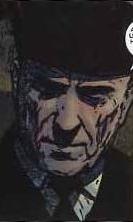
Alexander Bont is a fictional character appearing in American comic books published by Marvel Comics. The character was created by writer Brian Michael Bendis and artist Alex Maleev, first appearing in Daredevil vol. 2, #66. He was retconned into being the Kingpin of Crime before Wilson Fisk. His story was told via flashbacks, which were drawn to resemble artwork from the Silver Age of comic books. The climax of Daredevil Vol. 2, #65 alluded to Murdock having been Bont's attorney at one time. This plot thread was dropped however as it was revealed in later issues that Matt refused to be his lawyer.
Heroes is an American superhero drama television series created by Tim Kring that aired on NBC for four seasons from September 25, 2006, to February 8, 2010. The series tells the stories of ordinary people who discover that they have superhuman abilities and how these abilities take effect in the characters' lives as they work together to prevent catastrophic futures. The series emulates the aesthetic style and storytelling of American comic books, using multi-episode story arcs that build upon a larger, more encompassing narrative. It was produced by Tailwind Productions in association with Universal Media Studios. It was filmed primarily in Los Angeles, California.
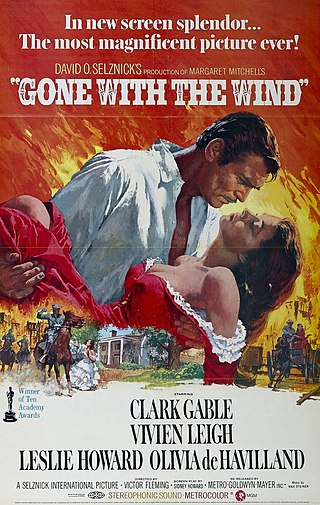
In film and television, drama is a category or genre of narrative fiction intended to be more serious than humorous in tone. Drama of this kind is usually qualified with additional terms that specify its particular super-genre, macro-genre, or micro-genre, such as soap opera, police crime drama, political drama, legal drama, historical drama, domestic drama, teen drama, and comedy-drama (dramedy). These terms tend to indicate a particular setting or subject-matter, or else they qualify the otherwise serious tone of a drama with elements that encourage a broader range of moods. To these ends, a primary element in a drama is the occurrence of conflict—emotional, social, or otherwise—and its resolution in the course of the storyline.

Big Hero 6 is a 2014 American computer-animated superhero film produced by Walt Disney Animation Studios and released by Walt Disney Pictures. Loosely based on the Marvel comics of the same name created by Man of Action, it is the 54th Disney animated feature film. The film was directed by Don Hall and Chris Williams and produced by Roy Conli, from a screenplay written by Jordan Roberts and the writing team of Robert L. Baird and Dan Gerson. The film stars the voices of Ryan Potter, Scott Adsit, Daniel Henney, T.J. Miller, Jamie Chung, Damon Wayans Jr., Genesis Rodriguez, James Cromwell, Maya Rudolph, and Alan Tudyk. Big Hero 6 tells the story of Hiro Hamada, a young robotics prodigy, and Baymax, his late-brother Tadashi's healthcare-provider robot, who form a superhero team to combat a masked villain who is responsible for Tadashi's death.

Horror films have frequently featured disability, dating to the genre's earliest origins in the 1930s. Various disabilities have been used in the genre to create or augment horror in audiences, which has attracted commentary from some critics and disability activists.













